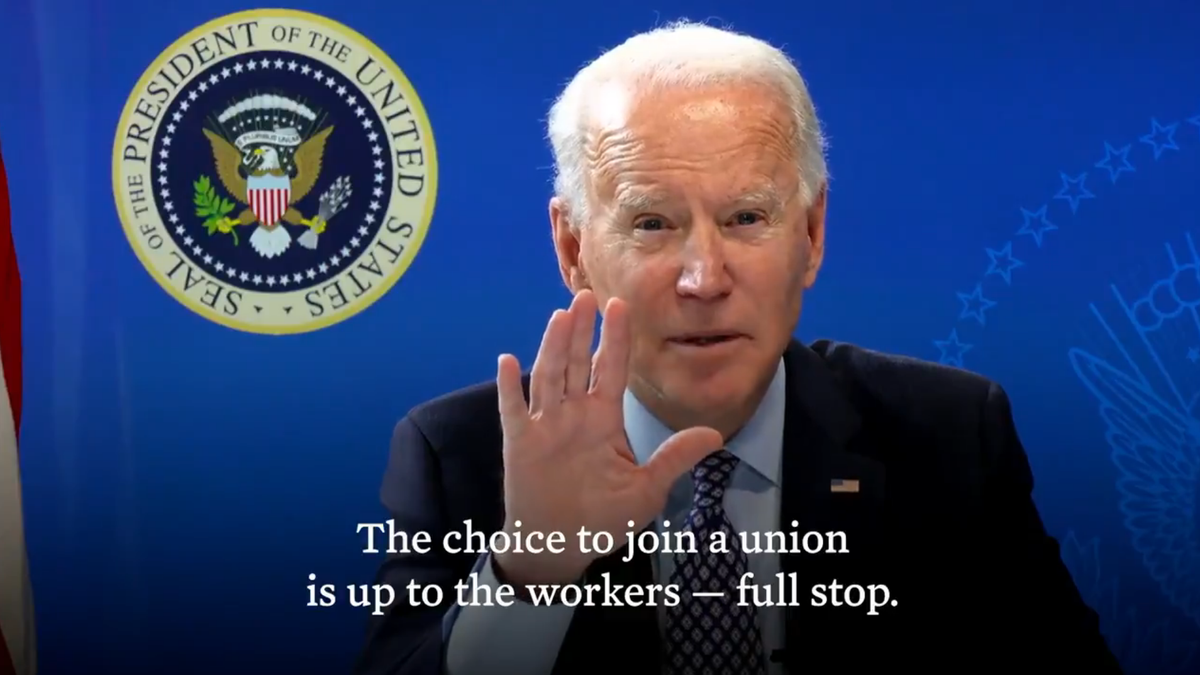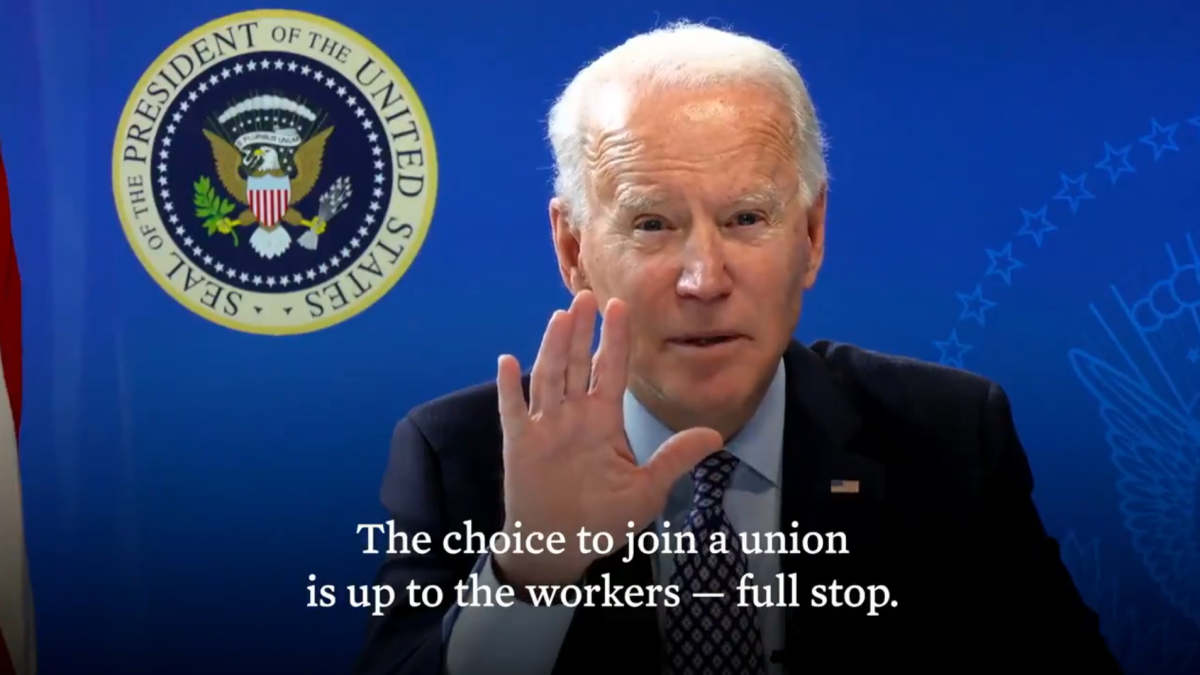
Joe Biden has effectively endorsed ongoing unionization efforts at an Amazon facility in the state of Alabama and warned the e-commerce giant that its efforts to shut down the drive must involve “no intimidation, no coercion, no threats, no anti-union propaganda.”
Workers for Amazon have long complained of everything from grueling hours and quotas in exchange for low compensation to astonishing levels of warehouse injuries, dangerous conditions during the coronavirus pandemic, dystopian workplace surveillance, driver tip skimming, and retaliatory treatment of particularly outspoken employees. Par for the course, Amazon has resisted labor organizers’ work to convince nearly 6,000 employees at a distribution center in the majority-Black city of Bessemer, Alabama to vote in favor of joining the Retail, Wholesale and Department Store Union, as well as organizing efforts more generally—using techniques generally commonplace in corporate America but which are being deployed with particular zeal by the e-commerce titan.
Amazon has bombarded workers with anti-union propaganda, texted them pro-management messages, posted job ads for union-busting experts, and forced them to attend mandatory meetings. In Alabama, Amazon executives sought to have the National Labor Relations Board postpone a union vote, as well as tried to force the vote to happen in person during the coronavirus pandemic. Labor organizers have told media that workers at the facility have been captive audiences to mandatory anti-union meetings and that managers tried to intimidate workers who challenge the information given in those sessions by photographing their work badges. The election is nonetheless proceeding on the terms Amazon tried to prevent, conducted via mail-in ballots that will be counted on March 30. The stakes are high: If workers successfully form Amazon’s first union in Alabama, it is likely to unleash a tidal wave of union campaigns at other work sites. A recent nationwide survey shared with Gizmodo showed the vast majority of hundreds of Amazon drivers polled were in support of forming their own unions.
Advertisement
In a video message posted to Twitter regarding “workers in Alabama” on Sunday, Biden reiterated his support for labor unions and said he would keep his “promise” to support organizing efforts. He didn’t mention Amazon by name, although there was no doubt to which employer he was calling out.
“You should all remember the National Labor Relations Act didn’t just say that unions are allowed to exist, it said that we should encourage unions,” Biden said. “Let me be really clear: It’s not up to me to decide whether anyone should join a union. But let me be even more clear: It’s not up to an employer to decide that either.”
G/O Media may get a commission
“The choice to join a union is up to the workers—full stop. Full stop,” Biden continued. “Today and over the next few days and weeks workers in Alabama and all across America are voting on whether to organize a union in their workplace. This is vitally important, a vitally important choice as America grapples with the deadly pandemic, the economic crisis, and the reckoning on race—what it reveals the deep disparities that still exist in our country.”
Advertisement
“And there should be no intimidation, no coercion, no threats, no anti-union propaganda,” Biden concluded. “No supervisor should confront employees about their union preferences… Every worker should have a free and fair choice to join a union. The law guarantees that choice. And it’s your right, not that of an employer, it’s your right. No employer can take that right away.”
The New York Times wrote it is “unusual” for presidents to weigh in on specific labor disputes (a sentiment that may only run in one direction, given the last administration’s unrelentingly hostile stance towards the labor movement and federal union busting attempts). The Washington Post wrote that Biden’s rebuttal is “striking” because Amazon’s senior vice president of global affairs, whiny corporate mouthpiece Jay Carney, served as the White House press secretary under Barack Obama and Biden’s administration. Carney was doubtlessly brought on under the expectation his tenure in the executive branch could help the company grease the wheels in D.C.
Advertisement
Faiz Shakir, a former aide to Vermont Senator Bernie Sanders, is the founder of More Perfect Union, one of the many labor advocacy groups that have urged Biden to speak out in favor of the Alabama union effort. Shakir told the Post that Biden’s statement was the biggest show of support for unionization to come from the White House in many years.
“We haven’t had this aggressive and positive of a statement from a president of the United States on behalf of workers in decades,” Shakir said. “It is monumental that you have a president sending a message to workers across the country that if you take the courageous step to start to unionize you will have allies in the administration, the NLRB, and the Labor Department. It means a lot.”
Advertisement
“It’s almost unprecedented in American history,” Erik Loomis, a University of Rhode Island labor historian, also told the Post. “We have the sense that previous presidents in the mid-20th century were overtly pro-union, but that really wasn’t the case. Even [Franklin Delano Roosevelt] never really came out and told workers directly to support a union.”
While Biden’s support for the Amazon effort is a major development, undoing Trump-era damage to the labor movement and institutions like the NLRB isn’t going to happen on a timeline anywhere close to overnight. The NLRB was controlled by Trump appointees who were eagerly used their power to launch sweeping assaults on workers’ rights, their ability to organize, and rules holding employers accountable.
Advertisement
The Biden administration’s new acting general counsel at the NLRB, Peter Sung Ohr, has rolled back numerous Trump-era directives. But Biden has yet to act on on major labor law reforms like the proposed Protecting the Right to Organize Act, which would add teeth to the NLRB’s regulatory authority, as well as prevent employers from forcing unions into bargaining impasses and implementing pro-management contracts.
